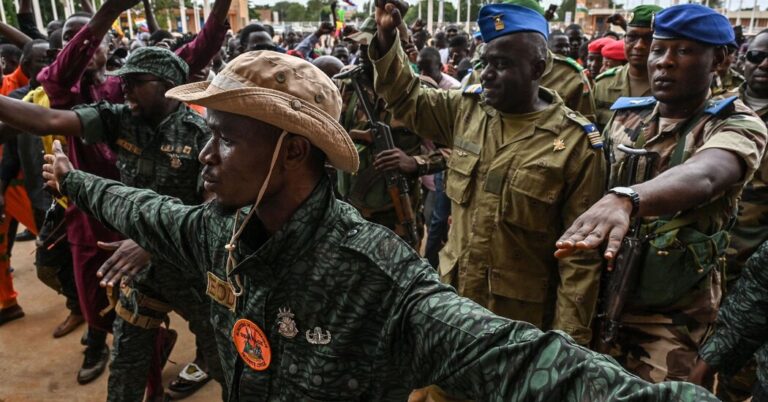West African leaders on Thursday said they had ordered the immediate deployment of a “standby force” ready to intervene against a coup in Niger, amid reports that coup leaders told a U.S. diplomat this week that they would kill the elected president in response to any such intervention.
Mutinous generals have been holding the president of Niger, Mohamed Bazoum, and his family hostage in their residence for more than two weeks. They have shunned mediation efforts and ignored an ultimatum by the West African leaders to relinquish power.
The threat to kill Mr. Bazoum was made to the acting U.S. deputy secretary of state, Victoria Nuland, during a surprise trip to Niger on Monday, and was first reported by The Associated Press. It was confirmed by a U.S. official, who spoke on condition of anonymity to discuss diplomatic matters.
The crisis in Niger has been humbling for several powers active in West Africa, including the United States, which has bases and troops in the country to assist in the fight against Islamist militants; France, the former colonizer, which has faced growing resentment over its presence in the region; and Nigeria, Niger’s giant neighbor to the south.
The announcement of a standby force came at the conclusion of a crucial summit on Thursday in Abuja, the capital of Nigeria, called by the Economic Community of West African States, the regional bloc known as ECOWAS, to address the crisis in Niger.
“No option is taken off the table, including the use of force as a last resort,” President Bola Tinubu of Nigeria, the new chair of the West African bloc, said in a statement on Thursday.
Representatives for Niger’s junta-appointed government did not respond to requests for comment.
The West African bloc had already threatened military intervention if Niger’s president was not reinstated by last Sunday. But heading into the summit on Thursday, its options appeared to be limited, and there were doubts it would follow through on the red line it had drawn.
The bloc’s standby force comprises about 2,700 troops, according to official documents, although several observers said they doubted it was operational.
After the summit on Thursday, President Alassane Ouattara of Ivory Coast told reporters that his country would supply a battalion of up to 1,100 soldiers to the force, alongside troops from Benin and Nigeria.
Niger borders four countries that are part of the bloc, but two of them, Burkina Faso and Mali, have said they would defend Niger’s junta in the event of a military intervention. Both of those countries have been suspended from the bloc because they are led by military juntas that took power in coups.
The last time troops from the West African bloc intervened was in 2017, to remove a leader who refused to accept his presidential defeat in Gambia, a country less than 1 percent the size of Niger.
Coup leaders in Niger on Thursday took further steps to cement their power, replacing the cabinet of the ousted president with a new government made up of 21 officials led by Ali Lamine Zeine, an economist and former finance minister.
The new government includes Gen. Salifou Modi, who was Niger’s military chief of staff until he was removed from his duties by Mr. Bazoum in April. An adviser to Mr. Bazoum said last week that General Modi had played a central role in rallying the military behind the coup. Five other military officers are in the cabinet.
Until mutineers detained him on July 26, Mr. Bazoum had maintained a close security partnership with Western allies, while buying drones from Turkey and developing a pipeline project with China’s national oil company.
The United States and France, two key security partners who have about 2,500 troops combined in Niger, have suspended their military assistance and called for the reinstatement of Mr. Bazoum.
In a briefing at the Pentagon on Thursday, U.S. Brig. Gen. Pat Ryder said that there had been no change to U.S. force posture in Niger, and that the United States hoped for a diplomatic resolution there.
On Wednesday, a religious leader from Nigeria, Khalifa Muhammad Sanusi, the emir of Kano, became one of the few mediators who has been allowed to meet the junta’s leader, Gen. Abdourahmane Tchiani. Details of the encounter were not made public.
Mr. Bazoum has remained stranded in his private residence with his wife and one of his sons, who is in his early 20s, for more than two weeks. The family does not have electricity or drinking water, and the junta has failed to provide food and refused to let the president’s doctor visit him, according to a friend and adviser to the president who requested anonymity to discuss his situation. The friend said the family was living on reserves.
António Guterres, the secretary general of the United Nations, said on Wednesday that he was very concerned about “the deplorable living conditions” for Mr. Bazoum and his family. He called for their immediate release, along with that of several government officials who have been in custody since the mutineers removed the president from power.
Matthew Miller, the U.S. State Department spokesman, said on Thursday, “In both public and private communications, the United States continues to raise the importance of President Bazoum and his family’s well-being and safety. We reiterate our calls for their immediate release.”
In Niger’s capital, Niamey, many have said they do not want Mr. Bazoum back in power. Omar Salifou, a music industry representative, stood guard at a traffic circle there on Wednesday evening, as he had on previous nights along with hundreds of other Nigerien civilians vowing to defend the generals in power against a foreign infiltration.
Amid cars honking and pushing through the crowds on the rain-soaked road, some young people could be heard shouting, in a video he sent to The New York Times, “Down with ECOWAS.”
Farnaz Fassihi contributed reporting from New York, and Eric Schmitt, John Ismay and Michael Crowley from Washington.



